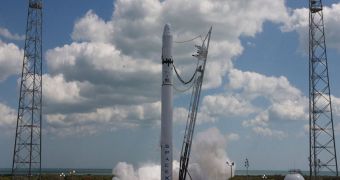Although officials at the Hawthorne, California-based Space Exploration Technologies (SpaceX) told the media that they were aiming for an April 12 launch date for their new, commercial space vehicle, it would now appear that the Falcon 9 medium-lift rocket is targeted for a May 8 lift-off. The new delay is due to the fact that the team of engineers managing the mission needs more time to run tests on a series of safety systems. It's the job of these mechanisms to ensure that the rocket is fully destroyed, in case it veers off course, and poses a danger to structures or cities in its path, Space reports.
The extra month will be used to more accurately calibrate these systems, the company announces. Even with the delay, SpaceX is still on schedule with the tests. The corporation is under a $1.6 billion contract with the American space agency, and it needs to demonstrate that its delivery system is capable of providing payloads into orbit by the middle of 2010. SpaceX representatives also highlight that it has always been its position that the first Flacon 9 launch attempt will take place sometime between March and May.
“SpaceX is working closely with Ensign Bickford Aerospace & Defense Co., supplier of key components of the Flight Termination System (FTS) that will be used on Falcon 9, to complete testing of the FTS hardware and provide final data to SpaceX and Air Force Range safety officials for review and acceptance. Certification of the Falcon 9 FTS and subsequent range availability will put the first Falcon 9 test launch towards the latter half of the anticipated March-May window, with the first attempt no earlier than May 8, 2010,” officials at the company said in a statement on Friday.
SpaceX wants to have this spacecraft ready to carry astronauts to the orbital facility within two years. While it remains to be seen whether this actually happens or not, the idea is that there is a lot at stake in the successful launch of this rocket. Under President Barack Obama's new budget plan, the American space agency will receive some $6 billion over the next five years for supporting the private space flight industry, and companies such as SpaceX and the Orbital Science Corporation are believed to be the strongest candidates for the bulk of the funding.

 14 DAY TRIAL //
14 DAY TRIAL //